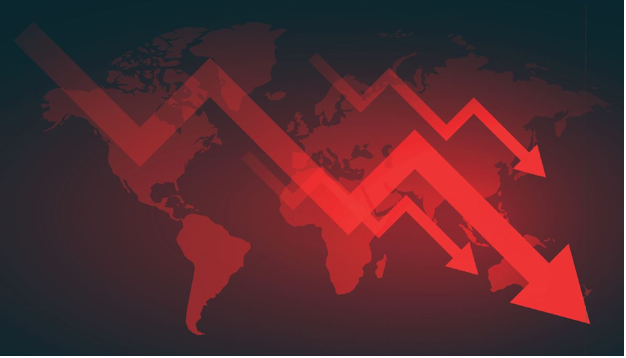آئی این پی ویلتھ پی کے
Moaaz Manzoor
Geopolitical tensions, especially the fear of regional conflict, have shaken investor confidence, highlighting the urgent need for trade diversification, reports WealthPK.

Rising geopolitical tensions and fears of a regional military escalation have sent shockwaves through Pakistan’s capital market, prompting steep declines in investor confidence and significant market sell-offs. As uncertainty intensified following government warnings of a possible Indian military strike, the Pakistan Stock Exchange (PSX) suffered a sharp jolt. In the final trading session of April 2025, the KSE-100 index plunged by 3.09%, closing at 111,327 after shedding 3,546 points.
This abrupt drop wiped out much of the monthly gains, resulting in a total decline of 6,480 points, or 5.5%, for the month. Investor anxiety was most pronounced across major blue-chip counters such as LUCK, FFC, ENGRO, PPL, HUBC, MCB, OGDC, MARI, EFERT, and UBL, all of which faced aggressive selling pressure. These stocks collectively dragged the index down by 1,892 points. Trading volume remained elevated, with over 486 million shares exchanging hands, valued at Rs30.8 billion.
CNERGY led volumes with more than 46.1 million shares traded. Analysts and market participants largely attribute this downturn to the “warmongering hype” and the possibility of a hostile military action by India. According to Ali Najib, Head of Sales at Insight Securities, “The PSX had a bloodbath in the last session, and the investor behaviour turned risk-averse almost instantly.” Commenting on the broader economic implications, Syed Basim Raza, Senior Researcher at the Centre for Law and Security (CLAS), emphasised the direct link between regional tensions and financial fragility at home.
“There is no doubt that tensions between states impact their economies. In the case of India-Pakistan tensions, the consequences are particularly grave —not only for both countries’ economies but also for the global economy,” he said. He pointed to the 2019 military standoff as a precedent, during which not only Indian and Pakistani markets but also global markets, such as those in the EU, saw declines of up to 0.5%.
“This historical pattern reinforces the understanding that “any further escalation would have severe implications for Pakistan’s already vulnerable economy.” Raza emphasised the need for structural reforms in trade strategy, urging Pakistan to focus on untapped trade regions. “Pakistan needs to revitalise existing trade partnerships and explore newer, more dynamic trade relationships,” he suggested. “Specifically, Central Asia offers an attractive alternative.”
According to a report by the State Bank of Pakistan, the potential trade with the SCO and Central Asian Republics is $10 billion. However, actual trade in FY24 was a mere $325 million. In comparison, India’s exports to Uzbekistan alone surpassed $500 million. “Historically, we have relied on a few countries for a significant share of our trade — a strategy that urgently requires a complete overhaul,” Raza observed.
He recommended that Pakistan proactively pursue Free Trade Agreements (FTAs) and Preferential Trade Agreements (PTAs) with countries where it maintains a trade surplus. “These strategic shifts could help insulate the economy from geopolitical shocks and ensure a more resilient market structure.” The capital market’s turmoil reflects how deeply geopolitical uncertainty can shake investor sentiment and economic stability. Diversifying trade routes and strengthening economic diplomacy can serve as buffers against future economic shocks.
Credit: INP-WealthPk












